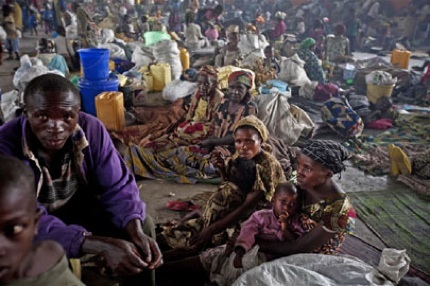Victims of war in Congo –Hard for sustained development under these circumstances
[Commentary On Global Development]
Without restoring peace and security ending poverty in Africa won’t happen
There is consensus that Africa has lagged behind other regions in implementing the Millennium Development Goals (MDGs) and will not end absolute poverty during the post-2015development agenda partly because of endemic conflicts and civil wars.
In its 2000 Constitutive Act the African Union has recognized the damaging impact of conflicts on the continent’s economic and social development and environmental protection. It has consequently stressed the importance of creating stable societies through inter-linkages between peace and development. Without peace there is no development and without development there is no peace and without both there is no respect for human rights and fundamental freedoms.
In recognition that conflicts increase poverty and exclusion, undermine growth and development and deprive many of their human rights and fundamental freedoms, the 2005 Blair Commission report on Africa stressed the importance of conflicts prevention to stop their emergence, spread and re-occurrence through increased investments in African capacities for early warning, peace keeping and economic development.
Conflicts and civil wars kill people, destroy infrastructure and institutions, create refugees and displace survivors and undermine efforts for development, job creation and poverty reduction that, in turn, contribute to further conflicts and civil wars and mass poverty traps. Conflicts divert funds from productive sectors to non-productive expenditures on police and the military. They also shift investments out of countries experiencing wars.
For example, in Uganda post-independence political and economic conflicts have resulted in brain drain and illicit capital flight; expulsion of Asians with vast development expertise and experience (returned after 1986 regime change), authoritarian regimes and wars particularly in the Luwero Triangle, Eastern and Northern regions that have stifled development and increased unemployment to unprecedented levels with potential for further conflict and rendered the country vulnerable to internal and external shocks despite the country’s abundant natural and human capital.
Before stopping or preventing conflicts and wars and paving the way for sustained rapid economic growth and sustainable development, it is important to identify their root causes and understand how they operate. With reference to Africa’s Great Lakes region where conflicts have been endemic, three principal causes have been identified and appropriate recommendations for their resolution offered.
There are those who argue that the main cause of conflicts is high population densities and rapid growth that has exceeded the carrying capacity of the region in terms of assets such as land and goods and services especially in Burundi, Eastern DRC and Rwanda thereby contributing to endemic conflicts, wars and genocides in Burundi and Rwanda.
Migration of human and animal populations out of these densely populated areas into neighboring countries of Tanzania and Uganda has increased the potential for conflict as the demand for goods and services has exceeded their supply. Increasing youth unemployment and environmental degradation if not addressed urgently will likely contribute to conflict and wars.
It has been suggested that a combination of corrective and preventive measures be undertaken including provision of family planning to manage reproductive behavior voluntarily; education of girls and empowerment of women and investment in peace building and labor-intensive programs. The World Bank has allocated $1billion for development purpose.
The second school reasons that conflicts are due to long-standing ethnic disputes that can be stopped through liberal democracy, equitable distribution of the benefits of economic growth and good governance that facilitates full participation of all groups in political, economic and social decisions that affect their lives. This will require genuine negotiations and compromise.
The third school contends that the principal factor in the regional conflicts is the external involvement in pursuit of geopolitical and economic interests. The involvement has been direct or through surrogates especially regarding conflicts and wars in the Democratic Republic of Congo. The proliferation of small arms and light weapons and establishment and funding of militias have accelerated conflicts that are destroying human lives and biological diversity the latter due to unsustainable exploitation of natural resources. Ending these conflicts will require a new development partnership that recognizes equitable development and mutual benefits of peace and development.
Because the three root causes coexist and have acted in concert to destabilize the region a multi-sectoral approach will be needed to stop them and prevent their re-occurrence. The international community should take up this matter in preparing the post-2015 development agenda.
Eric Kashambuzi; United Nations Foundation








